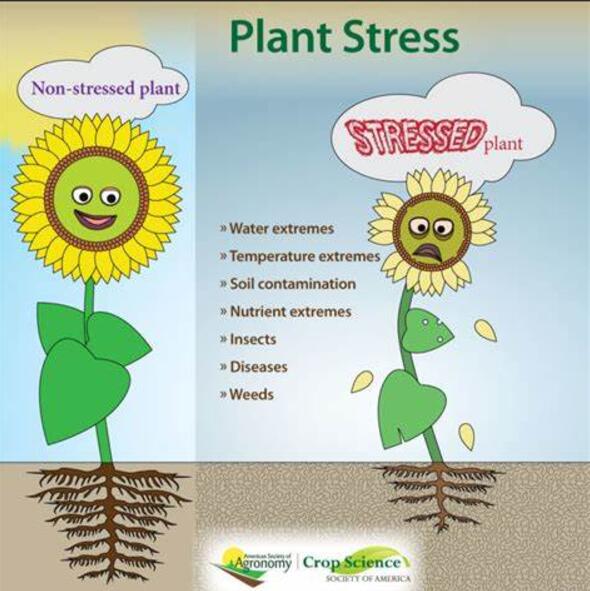Recent advances in employing plant rhizobacteria for environmental stress mitigation in plants
IF 6.8
Q1 PLANT SCIENCES
引用次数: 0
Abstract
Plants face a variety of abiotic stresses that can severely impact agricultural productivity and crop quality. Traditional methods, such as use of chemical inputs and resistant crop varieties, have had limited success, especially when suffering from multiple environmental stresses. Rhizobacteria with growth-promoting properties exhibit considerable diversity and inhabit the root zone of plants, thereby imparting multifaceted advantages to their host organisms. These bacteria can directly enhance plant performance by aiding in nutritional uptake, regulating phytohormones and mitigating the adverse impacts of stresses. Plant-associated rhizobacteria have been identified as a sustainable, eco-friendly biostimulant with potential to increase crop yield and abiotic stress tolerance capacity. Integrating these beneficial microbes into agricultural systems can reduce reliance on hazardous chemicals while improving the overall adaptability of agroecosystems to withstand adverse agroclimatic conditions. This review summarizes the recent advancements in understanding how beneficial microbes enhance plant stress tolerance, including direct nutritional support, phytohormone regulation, and induced systemic defences. PGPR-based biotechnologies employing bioinoculants provide better solutions for sustainable agriculture, reducing reliance on anthropogenic agrochemicals. This paper also aims to highlight the potential use of eco-friendly bioinoculants enhancing agricultural yield, ensuring sustenance food security and safety in the era of climate change.
利用植物根瘤菌缓解植物环境胁迫的研究进展
植物面临着各种各样的非生物胁迫,这些胁迫会严重影响农业生产力和作物质量。传统的方法,例如使用化学投入物和抗性作物品种,取得了有限的成功,特别是在遭受多重环境压力的情况下。具有促进生长特性的根杆菌具有相当大的多样性,栖息在植物的根区,从而赋予其宿主生物多方面的优势。这些细菌可以通过帮助植物吸收营养、调节植物激素和减轻逆境的不利影响来直接提高植物的生产性能。植物相关根瘤菌已被确定为一种可持续的、生态友好的生物刺激素,具有提高作物产量和抗非生物胁迫能力的潜力。将这些有益微生物纳入农业系统可以减少对危险化学品的依赖,同时提高农业生态系统抵御不利农业气候条件的总体适应性。本文综述了有益微生物如何增强植物抗逆性的最新进展,包括直接营养支持、植物激素调节和诱导系统防御。使用生物接种剂的基于pgpr的生物技术为可持续农业提供了更好的解决方案,减少了对人为农用化学品的依赖。本文还重点介绍了生态友好型生物接种剂在气候变化时代提高农业产量、保障粮食安全和粮食安全方面的潜在应用。
本文章由计算机程序翻译,如有差异,请以英文原文为准。
求助全文
约1分钟内获得全文
求助全文
来源期刊

Plant Stress
PLANT SCIENCES-
CiteScore
5.20
自引率
8.00%
发文量
76
审稿时长
63 days
期刊介绍:
The journal Plant Stress deals with plant (or other photoautotrophs, such as algae, cyanobacteria and lichens) responses to abiotic and biotic stress factors that can result in limited growth and productivity. Such responses can be analyzed and described at a physiological, biochemical and molecular level. Experimental approaches/technologies aiming to improve growth and productivity with a potential for downstream validation under stress conditions will also be considered. Both fundamental and applied research manuscripts are welcome, provided that clear mechanistic hypotheses are made and descriptive approaches are avoided. In addition, high-quality review articles will also be considered, provided they follow a critical approach and stimulate thought for future research avenues.
Plant Stress welcomes high-quality manuscripts related (but not limited) to interactions between plants and:
Lack of water (drought) and excess (flooding),
Salinity stress,
Elevated temperature and/or low temperature (chilling and freezing),
Hypoxia and/or anoxia,
Mineral nutrient excess and/or deficiency,
Heavy metals and/or metalloids,
Plant priming (chemical, biological, physiological, nanomaterial, biostimulant) approaches for improved stress protection,
Viral, phytoplasma, bacterial and fungal plant-pathogen interactions.
The journal welcomes basic and applied research articles, as well as review articles and short communications. All submitted manuscripts will be subject to a thorough peer-reviewing process.
 求助内容:
求助内容: 应助结果提醒方式:
应助结果提醒方式:


